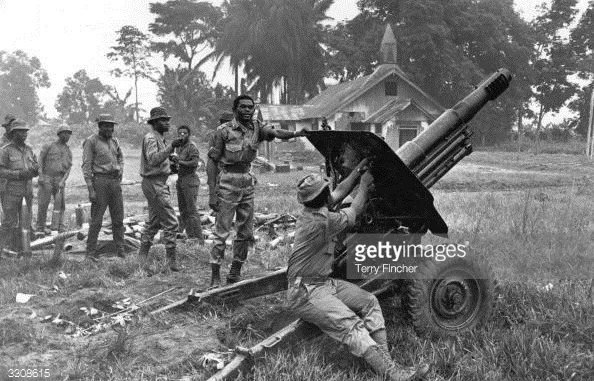
5. Adubi War of 1918
The Adubi war, also known as the Egba Uprising broke out in 1918, between June and August, as a result of the taxation system introduced by the British colonial government in Abeokuta, the present capital of Ogun State, Nigeria.
OldNaija gathered that more than thirty thousand (30,000) Egba people went to war against the colonial officials in Abeokuta, destroying many railway and telegraph lines in the southern part of the territory.
The Adubi war was mainly caused by the introduction of the direct taxation system on the Egba people as well as the cancellation of Abeokuta’s independence in the year 1918.
4. Aba Women’s Riot of 1929
The riots or war led by women in the provinces of Calabar and Owerri in southeastern Nigeria in November and December of 1929 is known as the “Aba Women’s Riots of 1929” in British colonial history and “Women’s War” in Igbo history.
The roots of the riots evolved from January 1, 1914, when the first Nigerian colonial governor, Lord Lugard, instituted the system of indirect rule in Southern Nigeria. Under this system, British administrators ruled locally through “warrant chiefs,” essentially Igbo individuals appointed by the governor.
Within a few years, the appointed warrant chiefs became increasingly oppressive. Colonial administrators added to the local sense of grievance when they announced plans to impose special taxes on the Igbo market women.
The Aba women’s riots prompted colonial authorities to drop their plans to impose a tax on the market women and to curb the power of the warrant chiefs.
3. Operation Wetie: Western Region Riots of 1962
The third on our list of historical riots/wars in Nigeria is Operation wetie. This was the name given to the series of riots that characterized both the political and civilian scene of the defunct Western Region of Nigeria in the 1960s. Operation wetie, in the context of the crises, means to douse or wet politicians, their properties and supporters with petrol and set them ablaze.
The bloody riots started with intra-party disagreements between the leader of the Action Group, Chief Obafemi Awolowo, and his deputy, Chief Samuel Ladoke Akintola. It all began when Chief Obafemi Awolowo gave up his post as the Premier of Western Region to seek power as the Prime Minister but lost and settled as the leader of opposition in the federal parliament.
Though the premiership mantle was handed over to Akintola, Awolowo still retained his post as the leader of the Action Group. However, Samuel Akintola did not reckon with Awolowo’s decision to remain the leader of the party and this brought about division of interest and loyalty in the Action Group. A faction of the Action Group pledged loyalty to Awolowo while another supported Samuel Akintola.
This caused serious uproar and unrest in the Western Region which later resulted in chains of violence. Several people were killed and properties worth millions were destroyed in days. Shortly after, a state of emergency was declared throughout the Western Region.
This became the first time in the history of Nigeria that a state of emergency would be employed to curb violence. Political opponents and their families were set ablaze and their properties too.
2. Kano Riot of 1953
Another one in this list of historical riots/wars in Nigeria is the Kano riot of 1953. In March 1953, a member of Action Group (AG) in the House of Representatives, Chief Anthony Enahoro, moved a motion requesting that Nigeria should be granted self-government in 1956.
The leader of the Northern People’s Congress (NPC), Sir Ahmadu Bello, moved a counter-motion. He proposed an amendment that self-government should be granted “as soon as practicable”. This led to disagreements over the motion and equally resulted in a strained relationship between the Northern and Southern leaders.
OldNaija gathered that the meeting of the House was adjourned and members of NPC were booed and called all sorts of names before they left Lagos for the North. A retaliatory move was made by Northern leaders in Kano to avenge humiliation they faced in Lagos after the self-government motion adjournment on March 31, 1953.
It was while Akintola and his group were in Kano that a riot broke out which is later known in history as the 1953 Kano riot or Kano riot of 1953. Several people lost their lives in the riot and scores were wounded.
1. Nigerian Civil War/ Biafran War
Nigerian Federal Troops in command of Port Harcourt after routing Biafran troops, during the Biafran War. Getty Images
The Nigerian Civil War, also known as the Biafran War, broke out between July 6, 1967, and January 15, 1970. This bloody war caused by the attempted secession of the southeastern provinces of Nigeria as the self-proclaimed Republic of Biafra.
Created as a colonial entity by the British, Nigeria was divided between a mainly Muslim north and a mainly Christian and animist south. Following independence in 1960, three provinces were formed along tribal lines, the Hausa and Fulani (north), Yoruba (south-west), and Igbo (south-east).
Tribal tensions increased after a military coup in 1966 which resulted in General Aguiyi-Ironsi, an Igbo, taking power as Head-of-State. This was followed by a northerner-led counter coup a few months later. Aguiyi-Ironsi was killed and widespread reprisals were unleashed against the Igbo.
Fearing marginalization within the state, on May 30, 1967, the Igbo-majority province declared its independence as the Republic of Biafra. Initially, its forces pushed back the Nigerian army but after a year of fighting, a stalemate developed.
The Republic of Biafra lost its oil fields which were its main source of revenue and without the funds to import food, an estimated one million of Biafrans died as a result of severe malnutrition.
On January 11, 1970, Nigerian forces captured the provincial capital of Owerri, one of the last Biafran strongholds, and Ojukwu was forced to flee to the Ivory Coast. Four days later, Biafra surrendered to Nigeria…..Seê _ Morê

Leave a Reply